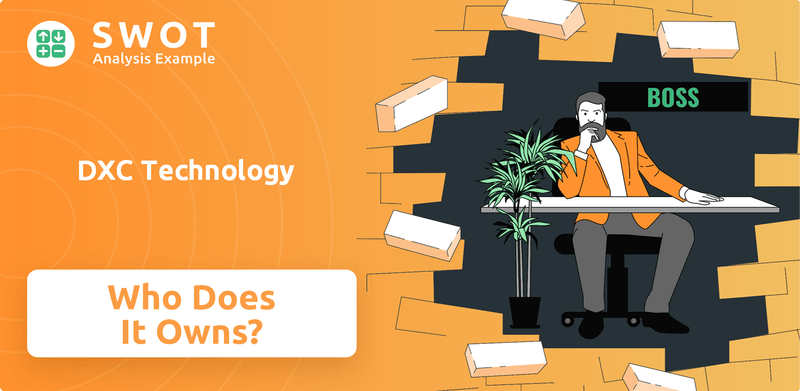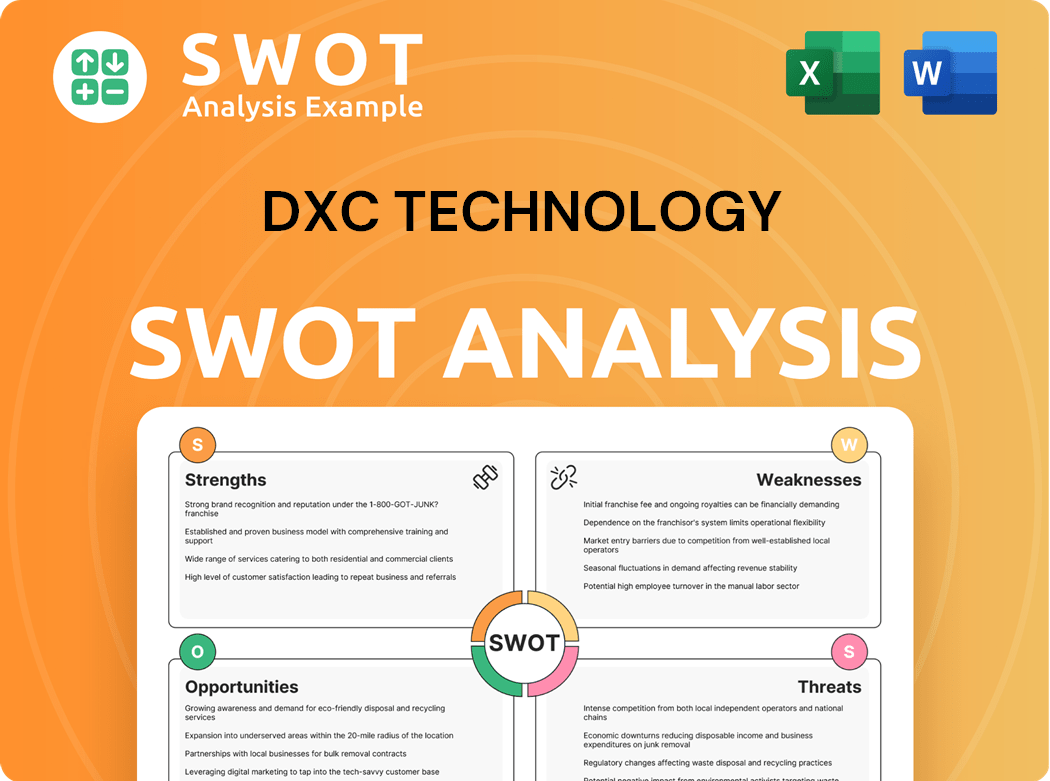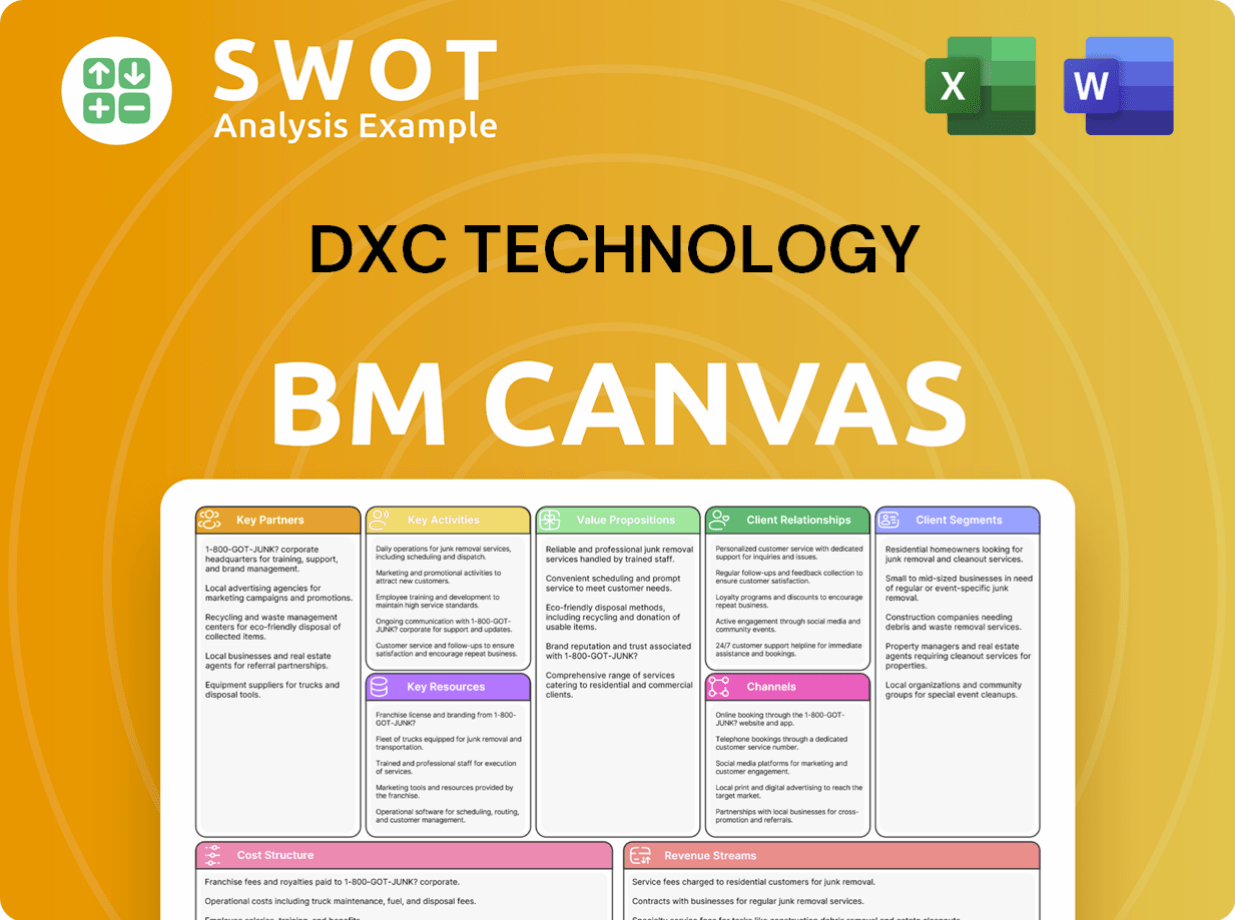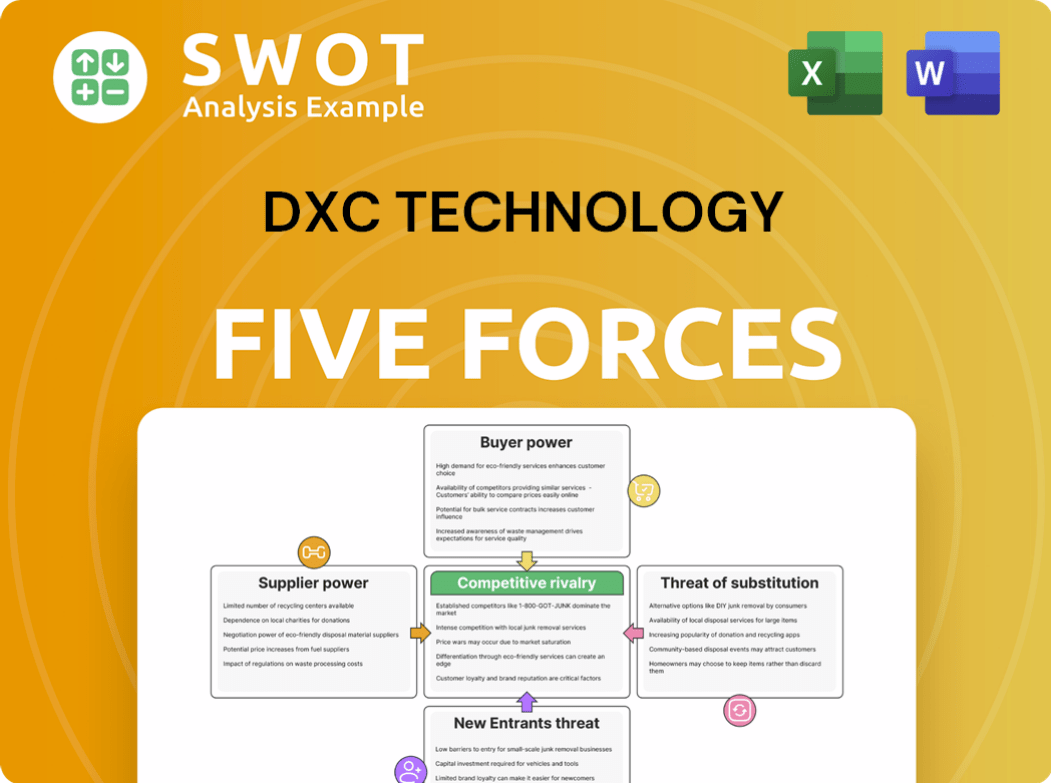DXC Technology Bundle
Who Really Controls DXC Technology?
Ever wondered who pulls the strings at one of the world's largest IT services giants? The formation of DXC Technology, born from a massive merger, reshaped the industry landscape. Understanding the DXC Technology SWOT Analysis is key to grasping the company's position. This deep dive uncovers the evolution of DXC Technology's ownership, from its origins to the present day.

From its inception as a merger between Computer Sciences Corporation and Hewlett Packard Enterprise's Enterprise Services, DXC Technology's ownership structure has been a dynamic story. Exploring the DXC Technology ownership reveals how key investors and public shareholding have shaped its strategic direction. This analysis provides critical insights for anyone tracking DXC stock, assessing its financial performance, or seeking to understand its place in the competitive IT market. The exploration will also cover the DXC Technology history and the current DXC Technology ownership structure.
Who Founded DXC Technology?
The genesis of DXC Technology, unlike many companies, wasn't through individual founders but through a strategic merger. This merger involved Computer Sciences Corporation (CSC) and the Enterprise Services segment of Hewlett Packard Enterprise (HPE). This significant corporate restructuring officially birthed DXC Technology on April 1, 2017.
Mike Lawrie, previously the CEO of CSC, assumed the role of the first Chairman, President, and CEO of the newly formed DXC Technology. The company's formation marked a pivotal moment in the IT services sector, creating a global entity with a substantial footprint from its inception.
As a result of the merger, DXC Technology began with considerable scale, boasting combined annual revenues of around $25 billion. This substantial size was a direct consequence of the merger of two established entities, leading to an immediate global client base and operational infrastructure.
The initial ownership structure of DXC Technology was a direct reflection of the shareholders of CSC and HPE at the time of the merger. This meant that the ownership was distributed among the existing shareholders of the two parent companies.
There were no traditional founders or angel investors acquiring stakes in the initial phase. The company emerged from large, publicly traded predecessors, altering the typical startup trajectory.
The primary focus during the early period was on integrating the operations, cultures, and systems of CSC and HPE Enterprise Services. This integration was crucial for the company's operational efficiency.
DXC Technology began as a publicly traded company, with its shares listed on the New York Stock Exchange (NYSE). This public status provided immediate access to capital markets.
The initial shareholder base comprised institutional investors and the general public, reflecting the ownership structure inherited from its parent companies. This broad ownership base is typical for companies formed through mergers.
In its first year, DXC Technology reported approximately $25 billion in combined annual revenues, demonstrating its immediate presence in the market. This figure highlights the scale of the company from its inception.
Understanding the formation of DXC Technology helps clarify its ownership structure, which contrasts with traditional startups. The company's origins in a merger significantly shaped its initial ownership and operational focus. For those interested in the company's strategic approach, further insights can be found in the Marketing Strategy of DXC Technology.
- DXC Technology's ownership is primarily distributed among shareholders of the former CSC and HPE Enterprise Services.
- The company started as a publicly traded entity, without traditional founders or angel investors.
- The initial focus was on integrating the operations and cultures of the merging entities.
- The company's substantial revenue base, approximately $25 billion, was present from its inception.
DXC Technology SWOT Analysis
- Complete SWOT Breakdown
- Fully Customizable
- Editable in Excel & Word
- Professional Formatting
- Investor-Ready Format

How Has DXC Technology’s Ownership Changed Over Time?
Since its formation in 2017, DXC Technology has been a publicly traded company. Its shares are listed on the New York Stock Exchange under the symbol DXC. The ownership structure is mainly composed of large institutional investors, which is typical for a publicly traded company of its size. As of May 23, 2025, DXC Technology's market capitalization is approximately $51.53 billion.
The ownership of DXC Technology is largely held by institutional investors. Key shareholders as of May 2025 include BlackRock, Inc., Vanguard Group Inc., and Dimensional Fund Advisors Lp. Vanguard Fiduciary Trust Co. holds 12.89% of the shares, while BlackRock Advisors LLC holds 12.16%. Dimensional Fund Advisors, Inc. has a significant stake at 5.631%. Institutional ownership accounts for about 94.81% of the company's shares. The remaining shares are held by individual investors and public companies. The influence of these major institutional investors is significant in the company's strategic decisions.
| Shareholder | Percentage of Shares Held (as of May 2025) | Notes |
|---|---|---|
| Vanguard Fiduciary Trust Co. | 12.89% | Major Institutional Investor |
| BlackRock Advisors LLC | 12.16% | Major Institutional Investor |
| Dimensional Fund Advisors, Inc. | 5.631% | Major Institutional Investor |
Several events have influenced DXC Technology's ownership and strategy. The acquisition of Luxoft in 2019, for approximately $2 billion, expanded DXC's digital capabilities. In December 2023, Raul Fernandez became President and CEO, succeeding Mike Salvino. This change in leadership signals a focus on operational execution and customer relationships.
DXC Technology is a publicly traded company with a significant portion of its shares held by institutional investors.
- BlackRock, Vanguard, and Dimensional Fund Advisors are among the major shareholders.
- The company's market capitalization was approximately $51.53 billion as of May 2025.
- Key events include the Luxoft acquisition and the appointment of Raul Fernandez as CEO.
DXC Technology PESTLE Analysis
- Covers All 6 PESTLE Categories
- No Research Needed – Save Hours of Work
- Built by Experts, Trusted by Consultants
- Instant Download, Ready to Use
- 100% Editable, Fully Customizable

Who Sits on DXC Technology’s Board?
As of May 2025, the leadership of DXC Technology includes Raul Fernandez as President and CEO, who was appointed in December 2023. Robert Del Bene serves as the Chief Financial Officer. The Board of Directors, chaired by David Herzog, oversees the company's strategic direction. Other key members of the Board, involved in crucial committees, include Robert Woods, David Barnes, and Carrie Teffner, who are part of the Audit Committee. This structure ensures oversight and strategic guidance for DXC Technology's operations.
The Board of Directors recently approved special one-time equity awards for CEO Raul Fernandez and CFO Robert Del Bene on May 13, 2025. These awards, comprising 85% performance-based restricted stock units (PSUs) and 15% service-based restricted stock units (RSUs), are designed to retain these key executives through fiscal year 2028. This decision reflects the board's confidence in their leadership and their commitment to aligning compensation with long-term shareholder value creation.
| Board Member | Role | Committee |
|---|---|---|
| David Herzog | Chairman | |
| Raul Fernandez | President and CEO | |
| Robert Del Bene | Chief Financial Officer | |
| Robert Woods | Board Member | Audit Committee |
| David Barnes | Board Member | Audit Committee |
| Carrie Teffner | Board Member | Audit Committee |
The voting structure at DXC Technology is based on a one-share-one-vote principle, common for publicly traded companies. While specific details on dual-class shares are not emphasized, institutional investors like Vanguard and BlackRock hold significant influence through their collective voting power. Insider ownership is relatively low, at approximately 1.23% as of May 2025, showing a slight increase from 0.83% in December 2024. This ownership level is typical for a large, publicly traded company.
DXC Technology's ownership is largely influenced by institutional investors due to its public status. The board of directors plays a crucial role in overseeing the company's operations and strategic direction. Recent equity awards aim to retain key executives and align their interests with long-term shareholder value.
- Raul Fernandez is the current CEO.
- David Herzog chairs the Board of Directors.
- Institutional investors hold significant influence.
- Insider ownership is around 1.23% as of May 2025.
DXC Technology Business Model Canvas
- Complete 9-Block Business Model Canvas
- Effortlessly Communicate Your Business Strategy
- Investor-Ready BMC Format
- 100% Editable and Customizable
- Clear and Structured Layout

What Recent Changes Have Shaped DXC Technology’s Ownership Landscape?
Over the past few years, the ownership structure of DXC Technology has seen notable shifts. The company has been focused on stabilizing its business and improving financial performance. For fiscal year 2025, DXC reported total revenue of $12.9 billion, although there was a 4.6% organic decline. However, the company showed strong bookings growth in the second half of the year, achieving a book-to-bill ratio of 1.28. These developments are key indicators of the ongoing evolution of DXC Technology ownership.
In terms of capital allocation, DXC Technology has restarted its share repurchase program. The plan includes $150 million for fiscal year 2026. This follows the completion of prior share repurchases during the first six months of fiscal year 2024. The company also approved an incremental $1.0 billion share repurchase authorization on May 18, 2023. Furthermore, share buybacks amounted to $12 million for the quarter ending December 31, 2024. These financial moves signal the company's approach to managing shareholder value and its commitment to its current strategy.
| Metric | Details | Data |
|---|---|---|
| Institutional Ownership | Percentage of shares held by institutions | Approximately 94.81% as of May 2025 |
| Insider Ownership | Percentage of shares held by company insiders | Increased from 0.83% to 1.23% in May 2025 |
| Stock Price Decline | Percentage decrease in stock price | 14.58% between June 10, 2024, and June 6, 2025 |
| Share Repurchase Plan FY2026 | Planned amount for share repurchases | $150 million |
Leadership changes and strategic decisions have also shaped the company. Raul Fernandez was appointed President and CEO in December 2023, succeeding Mike Salvino. Moreover, in May 2025, the Board approved special equity grants for Fernandez and CFO Robert Del Bene. This move is to ensure their continued leadership through fiscal year 2028. The company's focus on sustainable and profitable growth, along with investments in leadership, sales, marketing, and AI capabilities, demonstrate its strategic direction. The company's focus on sustainable and profitable growth, along with investments in leadership, sales, marketing, and AI capabilities, demonstrate its strategic direction. If you're interested in learning more about how DXC Technology generates revenue, check out this article: Revenue Streams & Business Model of DXC Technology.
DXC Technology's revenue for fiscal year 2025 was $12.9 billion, reflecting a strategic focus on financial performance.
Institutional ownership remains high at approximately 94.81% as of May 2025, indicating strong investor confidence.
Raul Fernandez was appointed President and CEO in December 2023, shaping the company's strategic direction.
The company plans $150 million in share repurchases for fiscal year 2026, showing capital allocation strategies.
DXC Technology Porter's Five Forces Analysis
- Covers All 5 Competitive Forces in Detail
- Structured for Consultants, Students, and Founders
- 100% Editable in Microsoft Word & Excel
- Instant Digital Download – Use Immediately
- Compatible with Mac & PC – Fully Unlocked

Related Blogs
- What are Mission Vision & Core Values of DXC Technology Company?
- What is Competitive Landscape of DXC Technology Company?
- What is Growth Strategy and Future Prospects of DXC Technology Company?
- How Does DXC Technology Company Work?
- What is Sales and Marketing Strategy of DXC Technology Company?
- What is Brief History of DXC Technology Company?
- What is Customer Demographics and Target Market of DXC Technology Company?
Disclaimer
All information, articles, and product details provided on this website are for general informational and educational purposes only. We do not claim any ownership over, nor do we intend to infringe upon, any trademarks, copyrights, logos, brand names, or other intellectual property mentioned or depicted on this site. Such intellectual property remains the property of its respective owners, and any references here are made solely for identification or informational purposes, without implying any affiliation, endorsement, or partnership.
We make no representations or warranties, express or implied, regarding the accuracy, completeness, or suitability of any content or products presented. Nothing on this website should be construed as legal, tax, investment, financial, medical, or other professional advice. In addition, no part of this site—including articles or product references—constitutes a solicitation, recommendation, endorsement, advertisement, or offer to buy or sell any securities, franchises, or other financial instruments, particularly in jurisdictions where such activity would be unlawful.
All content is of a general nature and may not address the specific circumstances of any individual or entity. It is not a substitute for professional advice or services. Any actions you take based on the information provided here are strictly at your own risk. You accept full responsibility for any decisions or outcomes arising from your use of this website and agree to release us from any liability in connection with your use of, or reliance upon, the content or products found herein.